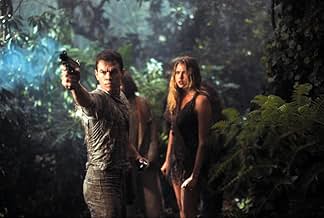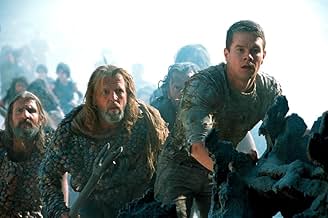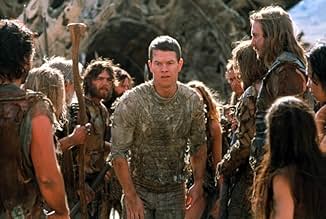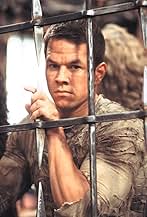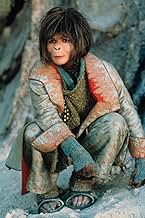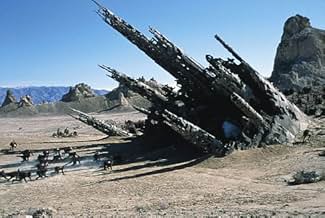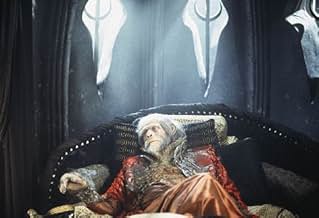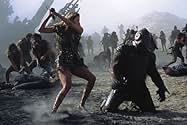Em 2029, um astronauta militar pousa à força em um planeta misterioso, habitado por macacos evoluídos que dominam a língua.Em 2029, um astronauta militar pousa à força em um planeta misterioso, habitado por macacos evoluídos que dominam a língua.Em 2029, um astronauta militar pousa à força em um planeta misterioso, habitado por macacos evoluídos que dominam a língua.
- Indicado para 2 prêmios BAFTA
- 11 vitórias e 32 indicações no total
Evan Parke
- Gunnar
- (as Evan Dexter Parke)
Enredo
Você sabia?
- CuriosidadesMark Wahlberg joined the film after meeting with Tim Burton for only five minutes. He was so anxious to work with Burton that he agreed to play any part. Wahlberg dropped out of the role of Linus in Onze Homens e um Segredo (2001) to do this film.
- Erros de gravaçãoWhen Leo enters the delta pod, he puts on his helmet and it loosely touches the collar of his spacesuit. In the next shots it fits perfectly in the collar.
- Cenas durante ou pós-créditosThe background on the 20th Century Fox logo fades to a starfield, before the logo itself fades out and the camera pans to the planet below.
- Versões alternativasThe final kissing scene between Mark Wahlberg and Helena Bonham Carter was edited out in the theatrical run when the movie was first released in India.
- ConexõesFeatured in Planet of the Apes: Rule the Planet (2001)
- Trilhas sonorasRule The Planet Remix
A Paul Oakenfold Mix
Additional Production by: Paul Oakenfold and Povi
Additional Guitars: Emerson Swinford
Avaliação em destaque
If one wants to remake a movie, the best option is probably to choose and original that was good, but not a great classic. Clearly, any attempt to remake a concept that failed first time around is fraught with danger, but an attempt to remake a classic runs the risk that one's film will be unfavourably compared with the original. The original 1968 film of 'Planet of the Apes' is one of cinema's great science fiction classics. More than an adventure story, it touches on some of the concerns of the late sixties- the fear of nuclear war, race relations- and also raises more fundamental issues about the relationship between man and nature, the relationship between religion and science, Darwinism and animal rights. It was therefore a brave move on Tim Burton's part to try and remake it.
The main concept of Tim Burton's film is basically similar to Franklin Schaffner's. An astronaut from Earth travels to a planet ruled by intelligent apes. Humans exist on this planet, but they are regarded as an inferior species, despised and exploited by the apes. There is, however, an important difference. In the original film, the apes are the only intelligent and articulate beings on the planet. Although they have only attained a pre-industrial level of civilization (they have firearms, but no power-driven machinery, and no means of transport other than the horse or horse-drawn vehicles), they are a far more advanced species than the planet's human inhabitants, who lack the powers of speech and reason and live an animal-like existence. In Burton's remake, humans and apes have similar powers of speech and intellect; it is only the apes' greater physical strength that enables them to dominate the planet and to treat the humans as slaves.
It was this ironic role-reversal, with apes behaving like men and men behaving like beasts, that gave Schaffner's film its satirical power. That film was advertised with the slogan 'Somewhere in the Universe, there must be something better than man!', and the apes are indeed, in some respects, better than man. Their law against killing others of their kind, for example, is much more strictly observed than our commandment that 'Thou shalt do no murder'. There is no sense that the apes are bad and the humans good. Even Dr Zaius, the orang-utan politician, is not a wicked individual; by the standards of his society he is an honourable and decent one. His weakness is that of excessive intellectual conservatism and unwillingness to accept opinions that do not fit in with his preconceived world view. (In this respect the apes are very human indeed).
Burton's film takes a less subtle moral line. It is a straightforward story of a fight for freedom. The villains are most of the apes, especially the fanatical, human-hating General Thade. The heroes are Captain Davidson, the astronaut from Earth, the planet's human population who long for freedom from the domination of the apes, and a few liberal, pro-human apes, especially Ari, the daughter of an ape senator. The apes are more aggressive and more obviously animals than in the original film; they still frequently move on all fours and emit fierce shrieks whenever angry or excited.
There are some things about this film that are good, especially the ape make-up which is, for the most part, more convincing than in the original film and allows the actors more scope to show emotion. (I say 'for the most part' because Ari looks far less simian than do most of the other apes- Tim Burton obviously felt that the audience would be more likely to accept her as a sympathetic character if she looked half-human). The actors playing apes actually seem more convincing than those playing humans. Tim Roth is good as the militaristic Thade, as is Helena Bonham-Carter as Ari. Mark Wahlberg, on the other hand, is not an actor of the same caliber as Charlton Heston, who played the equivalent role in the original film, and Estella Warren has little to do other than look glamorous. (Heston has a cameo role as an ape in Burton's film, and even gets to repeat his famous line 'Damn you all to hell').
Overall, however, the film is a disappointment when compared to the original, a simple science-fiction adventure story as opposed to an intelligent and philosophical look at complex issues. It tried to copy the device of a surprise ending but failed. Schaffner's famous final twist is shocking, but makes perfect sense in the context of what has gone before. Burton's makes no sense whatsoever.
Tim Burton can be a director of great originality, but with 'Planet of the Apes' he fell into the standard Hollywood trap of trying to copy what had already been done and remaking a film that never needed to be remade. It was good to see him return to form with the brilliant 'Big Fish', one of the best films of last year. 6/10
The main concept of Tim Burton's film is basically similar to Franklin Schaffner's. An astronaut from Earth travels to a planet ruled by intelligent apes. Humans exist on this planet, but they are regarded as an inferior species, despised and exploited by the apes. There is, however, an important difference. In the original film, the apes are the only intelligent and articulate beings on the planet. Although they have only attained a pre-industrial level of civilization (they have firearms, but no power-driven machinery, and no means of transport other than the horse or horse-drawn vehicles), they are a far more advanced species than the planet's human inhabitants, who lack the powers of speech and reason and live an animal-like existence. In Burton's remake, humans and apes have similar powers of speech and intellect; it is only the apes' greater physical strength that enables them to dominate the planet and to treat the humans as slaves.
It was this ironic role-reversal, with apes behaving like men and men behaving like beasts, that gave Schaffner's film its satirical power. That film was advertised with the slogan 'Somewhere in the Universe, there must be something better than man!', and the apes are indeed, in some respects, better than man. Their law against killing others of their kind, for example, is much more strictly observed than our commandment that 'Thou shalt do no murder'. There is no sense that the apes are bad and the humans good. Even Dr Zaius, the orang-utan politician, is not a wicked individual; by the standards of his society he is an honourable and decent one. His weakness is that of excessive intellectual conservatism and unwillingness to accept opinions that do not fit in with his preconceived world view. (In this respect the apes are very human indeed).
Burton's film takes a less subtle moral line. It is a straightforward story of a fight for freedom. The villains are most of the apes, especially the fanatical, human-hating General Thade. The heroes are Captain Davidson, the astronaut from Earth, the planet's human population who long for freedom from the domination of the apes, and a few liberal, pro-human apes, especially Ari, the daughter of an ape senator. The apes are more aggressive and more obviously animals than in the original film; they still frequently move on all fours and emit fierce shrieks whenever angry or excited.
There are some things about this film that are good, especially the ape make-up which is, for the most part, more convincing than in the original film and allows the actors more scope to show emotion. (I say 'for the most part' because Ari looks far less simian than do most of the other apes- Tim Burton obviously felt that the audience would be more likely to accept her as a sympathetic character if she looked half-human). The actors playing apes actually seem more convincing than those playing humans. Tim Roth is good as the militaristic Thade, as is Helena Bonham-Carter as Ari. Mark Wahlberg, on the other hand, is not an actor of the same caliber as Charlton Heston, who played the equivalent role in the original film, and Estella Warren has little to do other than look glamorous. (Heston has a cameo role as an ape in Burton's film, and even gets to repeat his famous line 'Damn you all to hell').
Overall, however, the film is a disappointment when compared to the original, a simple science-fiction adventure story as opposed to an intelligent and philosophical look at complex issues. It tried to copy the device of a surprise ending but failed. Schaffner's famous final twist is shocking, but makes perfect sense in the context of what has gone before. Burton's makes no sense whatsoever.
Tim Burton can be a director of great originality, but with 'Planet of the Apes' he fell into the standard Hollywood trap of trying to copy what had already been done and remaking a film that never needed to be remade. It was good to see him return to form with the brilliant 'Big Fish', one of the best films of last year. 6/10
- JamesHitchcock
- 2 de nov. de 2004
- Link permanente
Principais escolhas
Faça login para avaliar e ver a lista de recomendações personalizadas
Detalhes
- Data de lançamento
- País de origem
- Central de atendimento oficial
- Idioma
- Também conhecido como
- El planeta de los simios
- Locações de filme
- Empresas de produção
- Consulte mais créditos da empresa na IMDbPro
Bilheteria
- Orçamento
- US$ 100.000.000 (estimativa)
- Faturamento bruto nos EUA e Canadá
- US$ 180.011.740
- Fim de semana de estreia nos EUA e Canadá
- US$ 68.532.960
- 29 de jul. de 2001
- Faturamento bruto mundial
- US$ 362.211.740
Contribua para esta página
Sugerir uma alteração ou adicionar conteúdo ausente





